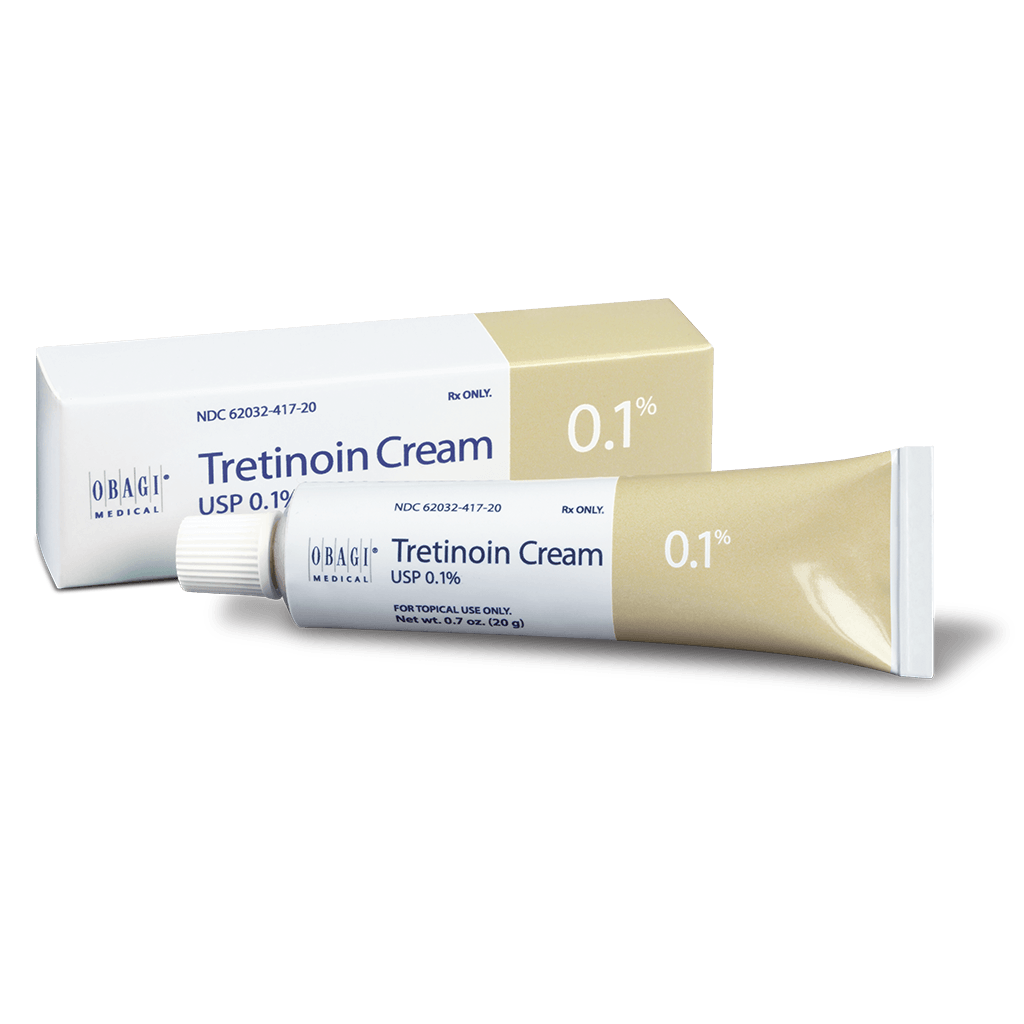Retinoids are a group of medications derived from Vitamin A and they can reduce acne, fine lines, dark spots, increase cell turnover and boost production of collagen. They are available as a topical cream only with a prescription and are commonly known as Retin-A and Tretinoin.
Retinol (vitamin A) is metabolized to four important products: all-trans retinaldehyde, all-trans retinoic acid, 14-hydroxy-4-didehydroretinol and beta-carotene. It is also a potent antioxidant.
What is Tretinoin?
Tretinoin is a topical treatment that helps treat acne, reduce fine lines and wrinkles, dark spots and hyperpigmentation. It also unclogs pores and boosts collagen production. It is a Vitamin A derivative and works on a cellular level to change the way your skin cells behave.
It is much more powerful than anti-ageing hero retinol and only available on prescription as a topical cream. Your GP or dermatologist will design your treatment plan, and may recommend that you start with a lower strength before moving up.
It can take a few weeks or even months for your skin to adjust, so be patient. During this time you might experience flaking, redness or sensitivity. It’s important to follow your doctor’s instructions, especially when it comes to how often and how much to apply. You should also avoid rubbing, scratching or exposing your skin to sunlight while using this treatment. You should also not use it if you are pregnant or breastfeeding.
How does Tretinoin work?
Tretinoin works by reducing skin cell turnover, unclogging pores and helping to control oil production. It also stimulates new collagen and elastin, giving skin a more even texture and firmer appearance. It reduces fine lines and wrinkles (Altreno), dark spots, rough skin (Refissa) and other signs of sun damage when used consistently over time.
It also has comedolytic-related activity, meaning that it reduces or eliminates the formation of pimples. It does this by normalizing phagocytosis, inhibiting transglutaminase activity, preventing foilicular plugging and creating a more aerobic environment that is less conducive to the growth of P. acnes.
Tretinoin can make the skin more sensitive to sunlight, so you should always wear sunscreen and a wide-brimmed hat when going outdoors. It is also not recommended during pregnancy as it can lead to birth defects in babies born to mothers who use it. It should also not be used by children under 18. It’s best to avoid alcohol and caffeine while using this medication as it can make the side effects worse.
What are the possible side effects of Tretinoin?
If you’re thinking about getting a prescription for tretinoin, you need to discuss all the risks and benefits with your GP or dermatologist first. Your doctor will design a plan just for you, including the strength and frequency of application.
It can take weeks or even months to show visible results, and this is a treatment that you’ll need to stick with. It’s a good idea to start with the lowest strength of 0.025%, and your doctor may decide to offer you a higher concentration later on in your treatment.
Some people may experience a life-threatening group of side effects known as retinoic acid-APL (RA-APL) syndrome, and your doctor will monitor you closely for signs of this, such as fever; weight gain; swelling in the arms, hands, feet, or legs; and breathing difficulties. Contact your doctor immediately if you experience these symptoms. Other side effects may include headache, weakness, nausea or vomiting, warmth or tingling in the face, stomach pain and dry mouth or nose (xerostomia). You can drink plenty of fluids to help with this, or try using nasal sprays or artificial saliva to ease the irritation.
Where can I buy Tretinoin in the UK?
Tretinoin is a powerful anti-ageing cream that can help to improve blemishes and minimise fine lines and wrinkles. It can also help to limit discolouration caused by sun damage. Unfortunately, in the UK, it is only available on prescription from a dermatologist. This can be a frustrating process for those who are looking to buy retinol for anti-ageing purposes.
Fortunately, there are now online pharmacies that offer tretinoin for sale without a prescription. These pharmacies source tretinoin from countries where it is still available over the counter. They then sell it to customers in the UK.
It is important to use tretinoin as directed. It can cause side effects, but they should be mild and temporary. It is also important to avoid using other skincare products that can irritate the skin, including astringents and shaving lotions, hair dyes and perms, and products that contain salicylic acid, benzoyl peroxide, or sulfur. Tretinoin can also make your skin more prone to sunburn, so it is important to use sunscreen when you are out in the sun. retin a uk

